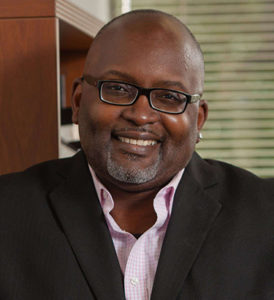As Eric Deggans gave the 2019 Peabody-Smithgall Lecture, he didn’t want to just stand on stage and pontificate. He wanted an interactive discussion of two of today’s hot button topics: race and gender.
But first he had to set some ground rules for his April 3 lecture, “Decoding Media’s Coverage of Race, Gender and Differences,” which also was designated a Signature Lecture.
“Talking about race and gender is not racist or sexist,” said NPR’s first full-time television critic and veteran journalist of more than 20 years. “Talking about race and gender is not racist or sexist—I always have to repeat that because the first thing that happens when you try to talk about this stuff is people come back at you and they say, ‘Why are you causing problems? Why are you stirring things up? Why are you making people mad?’ ”
For Deggans, though, that’s not the goal of the conversations he leads at NPR, as a contributor and analyst at MSNBC/NBC or in his book, Race-Baiter: How the Media Wields Dangerous Words to Divide a Nation.
It’s much simpler.
“To me, it’s like there’s a pothole in the road, and I’m trying to keep you from stepping in it,” he said. “I didn’t make the pothole. I’m just trying to keep you from getting hurt.”
National conversations about race are almost always precipitated by tragedies, Deggans said. Tensions are high; people are on the defensive.
That doesn’t make for an ideal climate to have an earnest conversation about the everyday experiences of prejudice and racism faced by black Americans.
Even when those conversations are had, it becomes clear that black Americans and white Americans have a fundamentally different lens through which they see progress, Deggans said.
White people focus on how far the U.S. has come. Black people see how far the U.S. has left to go.
With increasingly fractured news media that cater to specific audiences, stoking long-held fears and prejudices, bridging that divide seems insurmountable.
But it doesn’t have to be. It can be as simple as having an open, honest conversation with people who have different life experiences and assessing what can be done to make them feel safer.
“White people have a stake in race issues; men have a stake in gender issues,” Deggans said. “So often, it is easy to compartmentalize this stuff … but what we find out when we look at these issues is that equality serves everyone.”








